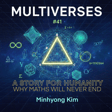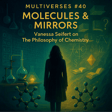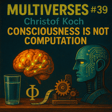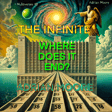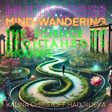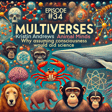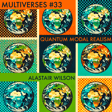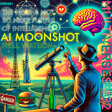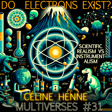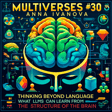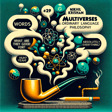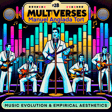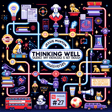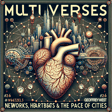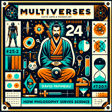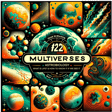Philosophy and Science: An Interplay
00:00:00
Speaker
I'm James Robinson, you're listening to Multiverses. We can think of the philosophy of science as being a step removed from science itself. so science is trying to produce scientific knowledge and the philosophy of science is trying to elucidate that and to incorporate it more broadly into our philosophical frameworks. The historian of science is also a step removed but in a different direction. They're trying to understand how it is we got this knowledge in the first place. Who are the individuals, what are the stories, or what are the societies that
00:00:36
Speaker
produced these scientific discoveries or just the slow drip-drop accumulation of scientific knowledge.
Patricia Farrer: Historian of Science
00:00:43
Speaker
I guess this week is Pratisha Farah, a historian of science. She is a an emeritus fellow of Clare College, Cambridge, and she's written a lot of wonderful books. um Science, a 4,000-year history I really enjoyed for its incredible chronological scope and the wonderful way that it's arranged, not chronologically.
00:01:03
Speaker
um She's written some biographies of Newton. ah She's written a lovely book about the rise in female scientists that came about with the First World War, a lab of one's own. And we have just a wonderful, wide-ranging conversation that I'm going to fail to summarise here, but we we touch on some themes like contingency.
00:01:24
Speaker
um how perhaps things could have been different within the history of science ah had apples not fallen. um And we talk about mythalology mythologizing and the stories we tell after the fact um about scientific discoveries and breakthroughs and the characters involved. um And I think the question is sort of there in the background, well, how how healthy is this?
Scientific Martyrdom: A Healthy Narrative?
00:01:50
Speaker
And I think explicitly at one point, you know Patricia says, well, for example, we sometimes have this ah view of a scientific martyr, someone who's given up their life in the pursuit of science. Mary Curie is kind of a paradigmatic example. And that may not be the helpiest the healthiest
00:02:10
Speaker
um I don't know, symbol or or points to um to dwell on, right? that That may not attract extra people um to become scientists and it may not be the best even way of pursuing science.
00:02:28
Speaker
um So I think this is just a wonderful conversation. It gives a window into the the views of a historian of science. And I think this is just a very valuable perspective. So I hope you enjoy this as much as I did.
Science: An Ever-Evolving Concept
00:02:49
Speaker
Hi, Patricia Farrer. Welcome to Moldversus. Well, thank you very much for inviting me to participate. And I'm looking forward to our conversation. Oh, wonderful. um yeah I'm going to start with a very big question. um What is science? What is science? um That's something I often ask my students that and they get very angry with me ah because um science My standard answer is science is what scientists say it is that they're doing. I don't think it is an abstract entity. I think you can describe yourself as doing science, but it's obviously meant so many different things to so many different people. And now, if we want to go back
00:03:29
Speaker
I know to the Babylonians or even to the Middle Ages, we we would more recently we would say that people are doing science, but they wouldn't themselves have said that they were doing science at the time. So it's a concept that's constantly changing. Most obviously it comes from the Latin word, well in English anyway, it comes from the Latin word scientia.
00:03:49
Speaker
which is knowledge but science in say I don't know the 18th century meant something very different from now science then meant book learning so you could have ah the science of history or the science of languages it's only relatively recently more or less during the 19th century that it became narrow it down to talk about knowledge, to mean knowledge of the natural world. So I think it's a very loose umbrella term and science is whatever you happen to think it is at the time. I guess one of the difficulties is this there's some justifiable
00:04:27
Speaker
um respect for science.
The Evolution of the Term 'Scientist'
00:04:30
Speaker
um and yes that science has been That respect has been established. I mean, I think it's related to the question of what is a scientist and what do scientists do?
00:04:43
Speaker
And one thing I do feel quite strongly about is it is completely amachronistic to use the word scientist before it was invented in the 1830s. It wasn't even in widespread use in this country until the early 20th century. And to use the word scientist to describe someone and say another thing. describe someone like Galileo, for example, or Copernicus is completely misleading because scientists now, they go to university to study what they're doing. There's a very strongly established career structure. um it's It's professional. It's held in high esteem. ah Scientists may well be religious people, but their religion does not enter the body of scientific knowledge. Whereas if you go back
00:05:27
Speaker
just a couple of sent two or three centuries into the past, what natural philosophers were doing was very different. As someone like Isaac Newton, for example, who's often seen as the forefather of modern physics, um was ah very much a very religious man who who thought that the whole point of studying the natural world was to get nearer to God. So I think those that's so those sort of considerations of how the pursuit of knowledge, the value of knowledge, the meaning of knowledge, how those have changed over time has to play into your bigger question of what science is.
Alternate Histories of Science Development
00:06:05
Speaker
Yeah, it it's really interesting in your in your book, um Science of 4000 Year History, um you talk about the different interactions. between science and and and other fields, and so both religion and alchemy were all melded together within Newton. He was famously called him not the first scientist, but the last the last great magician. the last public in who well that yeah the who something like the last That was what John Maynard Keynes said. to you
00:06:38
Speaker
the last Babylonian who looked out um with the on the world with the eyes of a magician, something like that. something yes i guess yeah um And as you say, well, scientists may still have their own um religious opinions now, but they don't they don't influence science as far as we can tell.
00:06:58
Speaker
Well, they probably do influence the the way that people approach the natural world. So I think there's an influence in that sense, but they don't openly articulate their religious beliefs within a scientific context. I think that's the difference.
00:07:13
Speaker
Right, right. Yeah, I think that makes sense. So there be certainly also an influence on the direction of science. like I'm wondering if if one were to write a history of science 4000 years from now, if people would look at what we're doing now as science or or maybe they'd sit at some kind of pre-scientific activity where we're getting lucky sometimes but really it's terribly disorganised and haphazard and ah you know there's still a lot of progress to be made in terms of delivering a process which actually is kind of reliably delivering knowledge.
00:07:54
Speaker
um Well, I don't know about 4000 years from now, but just looking after the oh considering the last 20 or 30 years, um bit less ambitiously, I mean, one obvious direction which I think science is taking, ah which I don't, I don't think is a good direction is that thanks to government regulations and thanks to the ref, it's far more directed. So this is so it's becoming far more applications based and there aren't the opportunities that they used to be for completely free thinking. There aren't the opportunities for experiments to fail. I mean, if you were writing a research proposal, you have essentially to set out what you're going to show. You can't do an experiment in the sense of, well, I'm going to see what happens. And under the current regime,
00:08:42
Speaker
it would have been absolutely impossible to just take one example. It would have been absolutely but impossible for ah Crick and Watson to absent themselves from their postgraduate studies and look at so something completely different and come up with the structure of DNA because everything's so tightly controlled and oriented and focused now, which I think is a great detriment to free thinking scientific endeavor. So perhaps we don't have people working within the religious paradigms as they used to, but they're working within
00:09:16
Speaker
a ah structure that's created by political forces, which maybe also constrains science in a sense.
Diversity and Inclusivity in Science
00:09:24
Speaker
There's also a great ah pressure to publish, and no one seems to have worked out in advance that the fact that in order to get promotion, you have to publish so many papers and so many books, and also the rules of open access, an absolute godsend to the publishers. I mean, who who can charge what what they like? I mean, that's another phenomenon ah modern science which I think is um a great failing. I wonder also if um people will look at the the representation of people within science and say well clearly something was wrong in the 20th century just as in the 17th and ah century it was
00:10:08
Speaker
just gentlemen who are doing science and people who are kind of independently wealthy or rich enough to do so, um they might look at today and say, well, there's there's just a thin slice of society represented here. So how could that be and know how could that generate the kind of outcomes or um foster a ah really diverse set of researchers as one would want?
00:10:36
Speaker
um Well, there is i mean there' far, far more access to education for everybody, whatever their background and whatever their gender than they used to be. Certainly there's far wider access than there was in the 17th century. I mean, there's far wider access than there was 20 years ago. If there'd be more petition participation of women in in science,
00:10:57
Speaker
would we genuinely expect some kind of different um sets of results, or perhaps different focus of um the fields that were prioritised? Or might we have seen more or less the the same kind of progression, I suppose? um I think in terms of knowledge, I this what if question is pretty impossible. ah In terms of knowledge, it might have been similar, certainly in terms of the way the working place of structured, I think it might have been very different. I mean, one of the great criticisms that women in academia have is the difficulty of ah um being a member of a family, of being a parent and how much that affects their academic careers. So rather than thinking about the content of scientific knowledge that's generated, I think in terms of how um scientific careers and how scientific work
00:11:58
Speaker
is structured how it operates. I think that might have been very different if women had been in charge.
Gender and Scientific Methodologies
00:12:04
Speaker
um For instance, there might be free childcare or there might be um greatphon greater involvement of men in the in bringing up their own children, which is certainly a direction in which families seem to be moving at the moment, which I think is wonderful both for the fathers and for the children, as well as for the mothers.
00:12:24
Speaker
Yeah, but I suppose, as you say, I think that's the differences are overstated in terms of what, you know, I think Christine Lagarde was driving out, there's a different attitude of risk. um And that was her point um between women and men. And I think that's maybe overstated. um and And so perhaps you have pointed out other ways, though, in which the the history of science is seems very contingent on particular um choices, discoveries, perhaps, and and external forces.
Tech and Science: A Symbiotic Relationship
00:12:57
Speaker
it What other ways do you think things could have developed?
00:13:04
Speaker
i mean there's An example you give at the beginning of of a 4,000 year history is is is simply to do with units and how it's quite, um not arbitrary, but um the fact that we have 60 seconds in an hour and 360 degrees in a um circle all traces back to the Babylonians. And and you suggest in fact that it's it's really to do with the the the ease with which you can write in figures in in clay tablets, which is, I think, just a really, really interesting insight that I wasn't aware of. um But on the other hand, that seems, you know but that's quite a, for one of the other words, it's kind of a thin difference in a sense. It's ah it's a difference of the way that we um express,
00:13:55
Speaker
um I don't know, ah It's a difference in the number system, but it's not a fundamental difference in the sorts of knowledge that we have, I suppose. um I wonder if, can we even envisage a history in which science had developed very differently? And we we had a completely different set of um discoveries now, or perhaps we had a similar set, but they had arrived in a very different order.
00:14:25
Speaker
um Well, I suppose you can look at how science and technology develop differently in different countries. I mean, that's one way of thinking about it. um So for example,
00:14:40
Speaker
um in the 17th century, the country that was most advanced technologically was China. And then for various reasons to do with the way ah the academic system was structured. The classic example is that there was bits a bit like the Middle East, that there was a great sort of lull in innovation in China.
00:15:01
Speaker
um and then and then Western Europe rose to power. But of course, that all those things are very Eurocentric way of thinking about the but history.
Global Perspectives vs. Eurocentrism in Science
00:15:12
Speaker
I think one of the most exciting developments in history at the moment is that new versions of the past are being written, which don't which don't all originate from the perspective of of um Northwest Europe, but later on adding in the Americas and the I think more global histories are being written and I think that's a more fruitful way of thinking about it. and Coming back to the the role of women in science and this kind of rewriting of of history, do you think there are opportunities to so understand better how um perhaps the the history of science that is presented so often is is one of some
00:15:56
Speaker
a a trail of, I don't know, great white men who have um made groundbreaking discoveries. Are there instances where perhaps some more overlooked figures um should be highlighted? Well, I think um a lot of work has been done during the last 20 or 30 years, mainly but not entirely by women, ah looking at women who've been overlooked. I mean, the the women who were working with their husbands, brothers, fathers, um doing doing a lot of the work who remain completely unacknowledged. So I think, so in that sense, we have a very different perspective. It also depends, partly on your first question, I mean, what counts as science? If you if you bring in things like, I don't know, cooking techniques and agriculture, ah then it's clear that women play a far greater role. I think there's also um the tendency
00:16:53
Speaker
There's a sort of truism that but when you write biographies of men, people tend to write biographies of their achievements. when Whereas when you write biographies of women, you tend to write about their feelings and their emotions. So if you think of someone like Mary Sklodowska Curie, who is the one woman in science that everybody has heard of, ah when when I um when I was a university, she was the only female role model that I had. And she was presented in a sort of very if you like, masculine sort of way. She she was always presented to me as a martyr to science, someone who sacrificed her womanhood, who never had any clothes, who never had anything to eat. She was starving. She was in a garret. She was working in the most appalling conditions. She sacrificed her whole life to science. And I think fortunately that that's a model of success, which is now being overcome. And actually, if you look at Marie Curie's life,
00:17:48
Speaker
in greater detail, is quite clear um it's quite clear that she she she did suffer. But on the other hand, that's a very negative role model.
00:17:59
Speaker
to present to budding scientists. I mean, it always seemed to me when I was at university and I was presented with this sort of photo of a miserable woman who was slaving away. It was absolutely no incentive whatsoever ah to want to go into science. So if we're going to encourage more women into science, I think we have to ah present more realistic role models, which are ah more
Celebrating Scientific Achievements: A Critique
00:18:19
Speaker
attractive ones. And the same goes for men as well. I mean, there's no reason why um being a scientist should it involve a huge amount of hardship and sacrifice. Do you think the, let's take the Nobel Prize, for instance, do you do you think it's the right way of celebrating achievement in in in science as it seems to kind of, again, propagate this idea of of individuals and and superhuman effort and and so forth? Well, that was what happened when
00:18:53
Speaker
I mean, there's some unrealistic competition. and And obviously, I mean, it's quite well known. there's ah that's It's ah perhaps now, but certainly in the past, it was not a prize that was always given on the basis of merit. though There were a lot of other reasons why particular um people ah were chosen. I have to think a bit more about that.
00:19:17
Speaker
I don't know what I was going to say. I was going to go back ah to when um Jim Watson um wrote wrote his book, The Double Helix, which was an absolute bestseller. And one of the reasons why other scientists absolutely hated it was it because in it, well, they they hated his representation of Rosalind Franklin, but what they also hated was the way that he he presented science as a cutthroat race. And the other people who he'd written about, like Linus Pauling and people like that, who he presented as being in the race said, we weren't in a race. That's not how we thought about it at all.
00:19:53
Speaker
So um he notoriously he ah three men got the Nobel Prize and Rosalind Franklin was excluded but that very sort of competitive cutthroat way of scientific research is not particularly productive and it's a way that it's represented in the literature rather than how it actually is. Yeah and Rosalind Franklin to remind people to took perhaps the key x-ray image of the double helix.
00:20:23
Speaker
ah Yeah, her PhD student, Ray Gosling, took the crucial photo. And then, of course, there's this huge controversy that's been going on for decades about whether or not she should have won the Nobel Prize. It seems to me that what became very apparent um a few years ago is that rather than um presenting her as the female victim,
00:20:49
Speaker
of male capacity, which is I mean, it's such a conventional trope to present a woman as a helpless victim. And that's how she's always portrayed. It would be a much more positive role model to present her as a pioneer in virology. She was only working on DNA for a couple of years. She hated it. She she left of her own accord because she couldn't stand the the working atmosphere. And she went to work at Birkbeck for the now And she started investigating varices. And she was the first person to find the molecular structure of a virus, the tobacco mosaic virus, which is one of the key viruses. And she went on from then and analyzed the structure of several others. And um when she died, she was working on the structure of the polio virus, which was later deciphered by her
00:21:42
Speaker
um colleague by her assistant, um Eron Flug. So, and especially since we've had COVID, it seems to me every reason why we should be celebrating her as the founder of Rherology, rather than representing her in such a conventional, need way as a helpless victim, which I think sort of downplays her own agency in a very detrimental way.
Recognizing Forgotten Scientists
00:22:13
Speaker
you Do you have um other examples of people that you'd like to highlight um unsung heroes or perhaps people who have been just mis misrepresented or a a side of their story has not been seen? Well, there's lots lots of um people who are completely forgotten. um So someone I'm very interested in and at the moment is Hertha Renton, who you've probably never heard of, who was about 13 years older than Marie Curie.
00:22:41
Speaker
and I've been reading about her reading about Marie Curie and it seems they were very close friends and Marie Curie of course is absolutely world famous because she happened to be making her discoveries in a field that was very important. Herther Ayrton also made substantial discoveries but they're about things that seem less exciting like making street lights work and working out the patterns of ripples in sand. But when you when you look at the lives, the lives they experience, they're constantly intertwined because they were two women of that period, the early 20th century.
00:23:17
Speaker
They were two women who both married to scientists, both had their own work passed off as being their husband's work, were both excluded from all the official societies like the Royal Society, or it's in England, or it's equivalent in France. And both of them were completely marginalised in ways that wouldn't happen now. And Heather Ayrton is someone that we've never ever heard of, but shes um she was the first woman who was allowed to give her own paper at the Royal Society. So before that, a woman had written a paper for the philosophical transactions, Mary Somerville in the middle of the 19th century, but she wasn't allowed into the actual building of the Royal Society, her husband, who was a doctor.
00:24:03
Speaker
had to go in there and we read her paper for her. But Hertha Ayrton was allowed to read her own paper. She was nominated by several fellows to be a fellow of the Royal Society. But she was turned down on um the excellent grounds that she was married. that That was the official reason why she wasn't allowed to become a fellow of the Royal Society. It was because she was married to another scientist. So she was constantly, constantly marginalised and sidelined. And when you look at Marie Curie's life,
00:24:34
Speaker
although she ah she obviously became far more famous than Hertha Lett and she also was constantly marginalised, there were problems, she couldn't file paintings under her own name, she couldn't become a member of the French Academy, she was absolutely vilified in the press as being a foreigner, an intruder, an invader.
00:24:56
Speaker
um And so the two women actually experienced very, very similar difficulties, even though one of them was world famous, and the other one we hadn't heard of. And they were very close friends. There were very few people like them, and they bonded together and saw each other very frequently. And Marie Curie came to stay in England for about three months with Hertha Renton. She went through a stage where she's had a complete ah physical and psychological breakdown. So Hertha Renton looked after her.
00:25:24
Speaker
and the two women and their daughters between them, they have three daughters, they spent the summer together. Do you think it's as important to understand science not as a series of theoretical breakthroughs, but in terms of all of the groundwork which
Cumulative Progress in Science
00:25:46
Speaker
enabled those. So in this case, it would be cumulative social breakthroughs that allowed women to participate more in science. But in other cases, we might think about the technological breakthroughs that i't developed optics for telescopes and and and so forth. How do you think about the very visible achievements of particular individuals versus all of the much smaller things going on all the time which paved the way?
00:26:15
Speaker
Well, but they paved the way, but there isn't a predefined direction. they could have um The same discoveries could have led to a very different outcome. um And that I mean, there's all the stories about key discoveries that were made that were completely ignored. So the classic example, I can't can't remember his name, is someone who who discovered that um in order to reduce the incidence of peripheral fever in a maternity ward, it made a colossal difference if before before the surgeons went in from the operating theatre into the maternity ward, if they washed their hands in antiseptic, then the um the mortality rate of the women giving birth just absolutely plummeted.
00:27:03
Speaker
um ah He reported that and wrote paper about it. ah But for 30 years, nobody did anything. I mean, they refused. The surgeons just just went on um entering the ward as usual and all that thousands of women died because they didn't take any notice. So it's not really enough to make the discovery. The discovery has to be accepted and ah broadcast and implemented. So the the science in the laboratory on its own is by no means enough.
00:27:32
Speaker
Yeah, so that there also needs to be I guess marketing that that that follows through on these marketing. um Yes, I mean, or being in the right place at the right time, there's someone who has to take advantage of the discovery. I mean, so um there's another example is when lasers were first discovered. For years, people said all these that's a really interesting theoretical discovery, but they're absolutely no use whatsoever. And it was quite a long time before practical applications were found for lasers like the CD's and surgery and all the other things that lasers are used for nowadays. I really like the example of um so Aristotle who
00:28:17
Speaker
so Archimedes and the um the Steam sphere, is that right? hey Oh, um the the little the little round sphere, that hero hero's sphere, ah that that was propelled by Steam? Yes, yes. Is that the one you mean? So so there was this little device which, as far as I know, which was intended as a sort of diversion, as a toy, as an amusement, a small model, and there was a little sphere with steam inside, and the jets of steam came out and propelled it round and round and round. So then, in a way, you could say that he he was the originator of the Industrial Revolution, but of course he wasn't. I mean, thousands of people so hundreds and hundreds of years went by this before all the other factors were in place for industrialization.
00:29:06
Speaker
One reason why industrialization happened in Britain before the rest of the continent is that we have the iron and the coal and the wood and everything else that you need. And also we have this the the the right people. that's often um The Industrial Revolution here is often attributed to the Lunar Society, the group of Northern Midlands um factory owners, um industrialists,
00:29:32
Speaker
doctors who met every month to to discuss ideas. So a whole range of factors had to come into place for industrialization to happen and to say that it was all invented by the Greeks with herosphere is really not right at all.
00:29:49
Speaker
Yeah, yeah. Just another example, I guess, of the kind of contingency within science. I mean, the Lunar Society met on days of the full moon because it was like safer to to walk around then and and to meet up. So like could sit they could see see their way back. I think they also had a sense of humour. I mean, they called themselves the lunatics. They they were aware that having their meetings on the Monday of the full moon was also ah opening the themselves to criticism, to mockery.
00:30:18
Speaker
I think it's also a good done example of the relationship between i guess industry, technology and science. and I think one of the most striking ones perhaps is um so thermodynamics and how we often think of technology as spinning off from science.
Future Tech and Science Discovery
00:30:35
Speaker
um But I think historically, there's probably been more flow in the other direction, where we've had quite some developed technology in in this instance, steam engines, and people wanted to understand how to make them more capable, more efficient. Steam engines were invented in the Cornish tin mines in the 17th century.
00:30:56
Speaker
And it wasn't until the early 19th century that all the formulae of thermodynamics developed. Another very good example of that is ah the laden jar, as sort what we would call an electrical capacitor, which was discovered sort of more or less accidentally that you could have a glass jar with water in and it could be used to store an electric charge. And according to the um ah according to the ideas, the theories about electricity at the time,
00:31:26
Speaker
it was absolutely impossible for it to work. It was only on it was only after the Leyden jar was invented that Benjamin Franklin invented a new theory to explain how it worked. So it's another very, very clear example, like the steam pump, about how how um the practical application preceded the theoretical development. So i yes, I totally agree. I think it often does work work the other way around. You you don't have scientists sitting in a laboratory thinking, oh, I'm going to invent something useful. yeah You get an application then people think about how they could explain that it works. I mean, I think it it there's many cases where and and so another really surprising case I thought was um
00:32:09
Speaker
that you mentioned was geometry and how it came from, you know, it can be traced back to the Babylonians again, who are measuring fields. And and that's, you know, if you think about the the etymology of that word, it really is, um you can see that it does boil down to, yeah, people trying to figure out how much tax you owe, depending on the size. I mean, the Babylonians weren't particularly interested in how the cosmos works. I mean, they they wanted to look at the stars to make predictions to find out when was was good time to to crown the king or or the ruler and that yes indeed they wanted to work out ah crop yields and things like that. and It was the Greeks who introduced the idea of using that mathematics to carry out astronomy. I'm wondering though if this kind of, um
00:32:56
Speaker
if now and in future we'llll we'll we'll see less of these, ah of technology really needing to be understood by science. I think obviously that the role of technology will will continue, and our perhaps becoming even stronger and in other ways in science in terms of us having a very large um technological projects to find ever smaller, exotic kinds of particle. What I mean is we don't seem to have places where we have some machine or something that we've invented and we don't really know how it works.
00:33:34
Speaker
to the contrary, we we've we've built, I don't know, computers and but and and and and semiconductors and solar panels and so forth came out of quantum mechanics. And it's hard to imagine that happening the other way around and somehow ah stumbling upon semiconductor junctions and then figuring out how they work. But so I wonder if we've We've just reached a level of abstraction with science where we'll find fewer cases like the steam engine, or maybe I'm just not being imaginative enough. um I think that's possible on the other hand.
00:34:13
Speaker
ah seems to me that around about the end of the 19th century, people were also thinking that they sort of discovered everything and then radioactivity came along. And um it seems to me, um although I'm absolutely not a high flying theoretical physicist, but there is always discussion of dark matter, making up a substantial proportion of the universe and you can't see it and you can't feel it and you can't touch it.
00:34:38
Speaker
all the rest of it and it seems to me on a very very obvious level that's exactly parallel to the end of the 19th century when supposedly ah there was this ether introduced by Isaac Newton, this this ether of invisible particles that are constantly swirling around that transmit gravity rather rather like sound is transmitted through air and people absolutely believed in the reality of the ether until Einstein came along um and introduced ah um special relativity in 1905.
00:35:14
Speaker
and that ah eliminated the need for an ether and I sort of I know that there's a great sort of divide still in theoretical physics between relativity and everything on a large scale and quantum mechanics everything happening on a small scale and then there's this dark matter and it always seems to me at a very superficial sort of level it seems a very parallel situation to the one that prevailed at the end of the 19th century and perhaps we're going to have some massive eruption of what Thomas Kuhn would call a revolution in theoretical physics and we'll head off in a different direction. That seems to me a very real possibility and if that were to happen presumably all sorts of new inventions that we as yet can't conceive of might emerge from that.
00:36:02
Speaker
yeah Yeah, well, I think lots of people are hoping for exactly that exciting scenario. But but but I wonder if it, yeah. And I think it does, um again, it reminds me of your point that we can't be too applied in the direction that we set for science. um we We need to create space for pure research. um Yes, free floating research. You have to you have to have experiments.
00:36:32
Speaker
with the possibility of proving a negative or finding that that's um a cul-de-sac that is not ah not a fruitful avenue to explore, but you need to be able to do that in order to experiment. yeah I wanted to ask as well about how you view the the roles of, or perhaps better put, the The goals of the historian of science and the goals of the philosopher of philosopher of science, if I can say that, um do you see a lot of continuity there or or or are there kind of distinct objectives to what people are doing?
Interdisciplinary Approaches: Bridging Gaps
00:37:08
Speaker
I think there's massive continuity between philosophy, history and science itself as it is being practiced. and I mean, there's also related fields like anthropology and sociology.
00:37:21
Speaker
um but i think one of as I'm a historian of science. I think one of the wonderful things about it is is in a sense it's the history of everything. i mean I write quite a lot about the history of art, for example. and we get students in the History and Science department who come from every single faculty in the universe in the university. So no, I think drawing hard rigid lines around the edge of a subject is a great mistake. And if you want to find new ways of thinking about what's happened in the past or what's happening in in the present, um I think as many analytical tools as you can bring to bear on it can
00:38:05
Speaker
only be beneficial. I don't think we need these hard lines between different disciplines. Yeah. And I think, I mean, it's interesting, I think many philosophers of physics at least are bordering on doing physics work in a sense that, you know, they're they're actually grappling with most of the problems. And I, and in a sense that the philosophy of all this, sorry, the the history of science offers something similar, perhaps a step further back. But but in that you know in looking at the past directions and that have been pursued, we we can perceive that, know for instance, this point that there needs to be space for free-flowing or free-floating research.
00:38:53
Speaker
that's very clear um when one looks back at the history of scientific successes, that often they have just kind of come from nowhere and from people who didn't have a very um strong agenda or um perhaps their their agenda certainly was peculiar to their own ideals, let's say. um So yeah I think are there other kind of, I don't know,
00:39:20
Speaker
What other advice would you give if you could set the direction or or wave a magic wand and change something about the way that um science is practiced or or the or even the the the problems that it focuses on? the way The way that science is practiced, not history of science. not historyies no yeah sure i I guess drawing from the history of science, what recommendations would you make for that very loose thing, science? um Well, um obviously, well, obviously, but I think not to remain too tightly focused within one particular discipline. So as knowledge is getting, um people are becoming more and more experts as becoming more and more difficult for scientists in different fields.
00:40:17
Speaker
to communicate with each other because they all have such specialised knowledge and very of a very narrow topic. And um I think some of the most exciting breakthroughs happen from interdisciplinary science when people can borrow insights from other fields. And this is true of history of science as well, that when you borrow insights from other fields and you can set off in a completely different direction.
00:40:45
Speaker
rather than a assuming that by going by heading off in a more and more concentrated way in a particular direction, obviously, you're going to find out more about a narrow field of knowledge, but I think there's colossal scope. Again, Crick and Watson are a good example. I mean, they're Schoeniger's What is Life of 1948, which had insights from mathematics and physics and biology and sort of thought about um the whole field of biology in a completely different way. And um and a new discipline was invented by chemistry, which hadn't existed in the past. Yeah, I think, yeah, that's ah it's a really good example. um ah And so now it's just reading last night, um not what is life, but um I don't know if you've come across it, but Benjamin lab at its when we cease to understand the world, which has these
00:41:41
Speaker
it's kind of series of essays slash mini-diographies and, gosh, Schrödinger was a very interesting ah character. Extremely, yes. Yeah, I mean, because he tried to apply the rules of physics to the living world, yes. Yes, yes. um yeah Yeah. And I think, yeah, I mean, what is life is just such a striking small book where he does kind of ah He almost guesses at the structure of of DNA, saying, well, it's got to be something that's almost like a crystal, but it's, well, ah a kind of aperiodic crystal, I think he describes it, something that's um crystal enough that it's pretty solid and and and fairly regular and robust. But so it's got to carry some information. And so it's got to be a little bit, I don't know, more complex than that. ah So yeah, it's really fascinating. I mean, another interesting thing I showed you doing is he
00:42:36
Speaker
I do think sometimes we um get fixated on a particular model of um sort of scientific genius, perhaps. Schrodinger was a very, very clever guy.
00:42:51
Speaker
and and But he sort of broke away from the mold in so in in one sense, in which that he wasn't a particularly successful physicist for quite a long time. and he only quite late, and um at least the way that Benjamin Labattut tells it, ah very fortuitously i came up with um you know the Schrödinger equation, for which he's best known, I'm sure. um And again, at least in Benjamin Labattut's telling, and ah you may know, or you may disagree, but, so ah well, Schrödinger and his wife had a very, comp but well,
00:43:32
Speaker
they both have a lot of different romantic interests. And one of her romantic interests was a um Dutch physicist at the same faculty as Schrodinger at the time. And Schrodinger was presenting de Broglie's ideas on how not only photons but and electrons and and all matter were waves and particles and both. um
00:44:04
Speaker
And he he had some incisive and and I think in Schrodinger's mind, almost rude questions from this this this Dutch guy. the The Dutch can be very blunt. ah I mean, that's that's famous. yes It's a big generalization. I don't want to say the Dutch are very blunt. But suddenly, um and that's an unfair generalization, let's say. But um anyway, he got these questions. And one of them was, well, you can't you know how can you talk about all this and without an equation?
00:44:36
Speaker
which which um says how these things move around. And then Schrödinger went to an asylum for his, or an asylum, a sanatorium for his, a bout of tupa tuberculosis, and I think it all kind of came together. um Maybe it would have come together had all these things not happened, ah impossible to know, but I think very interesting as ah as a story and an example of um Yes, the ah the apparent contingencies in in in how we get out, you know, how a progress comes about. Yeah, but I think also, it's quite interesting the way that we people love constructing stories about discoveries and creating ah myths. So some of the the famous ones, well, one of the most famous ones, obviously, is Archimedes jumping out of the bath or
00:45:29
Speaker
Newton and the apple and James Watt and the boiling kettle or Keckulay looking and into the fire and seeing a snake. quite curling around. I mean, all all these sort of mythological stories surround the notion of genius, which is how you introduced it. i is It seems to me that concept of genius is a very problematic one, because for one thing, it suggests that a genius is rather like a saint, that their so genius is someone almost invariably a male, who's fundamentally intrinsically different
00:46:05
Speaker
from other human beings, not just somebody who's very clever, but someone who's in a different sort of angelic sort of
The Myth of Scientific Genius
00:46:11
Speaker
realm. And I think that's a sort of mythical version of humanity that's very appealing to us and that in general, we just keep recycling the same mythical stories in different ways. So this story that you just told about Schrodinger and his wife and de Broglie and all the rest of them, it is is a story and we like to tell stories, human beings like to tell stories about origins I think that's often different, completely different sort of stories that you can tell. Yeah, I wonder, ah you've pointed out the the word genius has been used differently throughout time, and it's become something, a a property of a a person now. um But in the past, if if I'm right, it was more, ah you know, a little genius that sat sat on your shoulder. And it was a gift that was given to you by God at birth.
00:47:03
Speaker
and And it was more directed as well, is that right? So Lucerne said to have a mathematical genius rather than to be a genius. Yes, whereas now now it's an absolute term, yes. Yeah, and as you say, it's it's similar to canonization in that you know it's applied to the the full person and it has that kind of yeah mystical glow to it. I do worry about it because I think, you know,
00:47:34
Speaker
we look at people I i think Elon Musk is going to my mind right now as someone that you know there's lots of big controversial figure and many people will say oh he's a genius and I've no doubt he's a wonderful you know very good entrepreneur and um ah very intelligent but again putting that label on him people assume or People think, oh, well, that means he can do anything, right? If he becomes, you know, if Trump becomes president and Musk takes this special role in in government, of course he'll do well at it because he's a genius, right? He's just got this magic touch which makes him
00:48:10
Speaker
you know good at anything. I think that value is quite ah that is a dangerous way of thinking about that. Yes, and also you're allowed to behave how you like. ah you could be If you're a genius, you're allowed to be terribly rude, or um you don't have to ab obey the rules that the rest of society does, you you're somehow exonerated.
00:48:30
Speaker
In fact, you're we're probably in in some sense, you're kind of encouraged to do that, and that it makes yeah it makes better stories, right? Yeah, someone like, well, Einstein would be a good example of that, or else Isaac Newton, I mean, the stories of their eccentricity abound. But whether or not that that was their normal behavior, or whether it was something that was invented and then exaggerated, it's impossible to know.
00:48:55
Speaker
I think one thing i I do think that the idea of genius does do quite well, however, is is it gives this sense of um if instead of us thinking of a genius, if one thinks of moments of ah of of genius or or there is this idea of a genius of of kind of like inspiration, I suppose. yes And that's one thing that all of those stories yeah you mentioned have in common, you know, the bath and the apple and and so forth. um And while I'm sure they're apocryphal to to an extent. I'm also sure that they the they do capture something of
00:49:33
Speaker
the the process. um Another story I really like actually is just Einstein shaving in the mirror every day and just thinking each day as he looked at himself or what's going on like with these particles of of light it's quite it's another kind of moment of and I don't know stillness inspiration.
00:49:58
Speaker
Yeah I don't know how do you feel Yes, do you think there is this kind of creative spark or or or that? You have to have a huge amount of knowledge in order to make that leap. I think also that sort of aha feeling is something that everybody has to a much lesser extent in ordinary life. I mean, if you're doing a crossword puzzle or I don't know if you're working on a maths problem. It's funny, you could work on something for ages and suddenly
00:50:31
Speaker
it all comes together and you work it out. But I think the myth of genius disguises the amount of hard work that's needed. So going back to Newton, he supposedly had the flash of inspiration when he was at Walsall during the plague in the 1660s was supposedly when he watched the apple fall from the tree. But his great book on gravity, The Principia, didn't come out until 1687 because it took him 20 odd years to car do the experiments, to work out the mathematics, to consolidate it from that original kernel of an idea. ah So it's rather like ah e Edison said that um genius is 1% inspiration, 99% perspiration, and I think there's a lot of truth in that.
00:51:17
Speaker
Yes, yeah, it's just the 1% makes the better story. And then the rest of the 99%. And people like stories, but then it becomes the whole of science becomes romanticized and mythologized. And I think one of the efforts that historians of science have been making during the last 20 or 30 years is to debunk all those stories is to go behind them and just try to present some sort of reality. But of course,
00:51:47
Speaker
whatever you do as a historian, you've got all the facts in front of you and you can interpret them in different ways and different people will always give different versions of what happened in the past and that's what for me makes being a historian so exciting as you can put your own imprint on the past and you can retell it. there's ah There's always room for a new story to emerge.
00:52:08
Speaker
yeah yeah i And this idea of, I mean, one thing I actually quite like about the the Einstein example just to ponder on it a tiny bit more is there's no instant, as far as I understand, where he, I mean, he has this idea of riding on a photon, but I like to picture him doing the same routine day after day and just like allowing him the self, the space to to to think on this problem. And he has all the pieces there, you know, everyone's done there.
00:52:38
Speaker
um Nicholson and Morley have done their experiment and there's all these kind of contradictions and problems flying around. He apparently didn't know about the Nicholson and Morley. Oh right, really he didn't. um when ah When he devised the theory of relativity in 1905. So that that's a very good example of one of the great myths. It makes such a good story that Nicholson and Morley showed um showed there wasn't Etherdrift and Einstein proved it, but it didn't happen like that, it was independent.
00:53:07
Speaker
Well that that actually makes it even more interesting in that. Yeah, he, he was able to make so much I i actually i I mean in in some ways.
00:53:18
Speaker
one the the special real theory of relativity is something that could have come so much earlier, because um it actually so simple to derive from just a single principle. A wonderful example of contingency, as you just said yourself, it could have come much earlier. Perhaps, I mean, how many other laws or supposed laws of nature are there that would never elucidated at all?
00:53:47
Speaker
or are still waiting to be elucidated that could have been stated at 100 years earlier. Yeah. what you might mean perhaps up pass Perhaps they were, right? Perhaps some of these things were captured like the example of the, um ah you know, washing one's hands, ah but they just, they just didn't get picked up. Yes. Or else at the other classic example of that, of course, is Mendel's experiment on split peas.
00:54:14
Speaker
which sat around in an obscure journal for about 40 or 50 years, ah before it was discovered independently by three different people. And then thanks to Patrick Bates and became the foundation of modern genetics. Yeah, yeah. Yeah, it's it's it's really, a yeah,
00:54:34
Speaker
it's very hard to imagine how how different the world could be, because science does seem so kind of ineluctable in that we get this thing, we get that thing. um But yeah, and then if you think back, I mean, genetics is a good example, it's very easy to make a simple equation that you had Darwinian evolution, and then you added in Mendelian genetics, and you've got the form of evolution that we have today. But it was absolutely not like that. There were all sorts of other experiments or some other avenues of research that ah mathematical ones as well as environmental ones um and it wasn't until the 1930s that a new synthesis was reached and um evolution was still contested territory and yet still, still, still we celebrate endlessly we celebrate Charles Darwin as the man who went to the Galapagos Islands saw the different ah shapes of beaks on the different islands and
00:55:29
Speaker
Hey, Presto, that was the theory of evolution. The real story is much more more complicated and I think probably much more interesting. Yeah, I guess it starts earlier and finishes later. I'm curious if it starts with his relation. There's lots of debates about the theory of evolution. Yeah. Yeah. I've read recently um ah The Hail Mary Project by Andy Weir. He wrote the The Martian. And one of the things I really loved about it was so without getting away too many spoilers and
00:56:05
Speaker
this, the the kind of human protagonist meets an alien, and they've both traveled to a different star system. It's a novel, yeah. no yeah okay And they've both traveled to a different star system. And this alien, ah he was on a ship with a large crew, but all of his crew members have died. And ah he can't work out why. um And this alien has like incredible, that that is kind of like, they use acolycation, they don't have eyes. um So they don't see radiation, right? As we see, we never think of ourselves as seeing radiation, we just think, so but we do see radiation. And so they' there's all sorts that they've never discovered radiation, and his ah his crew members have died of of radiation sickness.
00:56:53
Speaker
um But they also hadn't discovered relativity. And so it also arrived at this planet much sooner than it expected. But they had managed to make um you know really powerful rockets. They had really good material science, um way beyond human material science. So they could kind of weld and they just developed incredible kinds of strong um ah materials that could withstand all sorts of heat because they were also much, much um hotter than we were. So I thought that was a really great example that of how, I guess, our physical constraints may well have
00:57:36
Speaker
influenced the path that our science has taken. you know We gaze at the stars right and they have been an influence of of wonder for so long and and then that led to really expensive instruments being built and really elaborate theories and um And then more simple theories, more accurate theories. But um you know certainly, there's ah there's a lot of physical contingency, I think, in the in the history of science. But it's very hard to picture how my feeling is there is as much historical contingency as well. But it's it's maybe harder to visualize how things could have um developed um very differently.
00:58:22
Speaker
um let I think that's right. um And I think now it's even more difficult to imagine because communications are so good around the world that society is much more uniform than it's ever been in the past. But if you went back a few hundred years and you sailed from, I don't know, from England to the Americas and then to China, for it just three random examples, you would have seen very different ways of living and different understandings
00:58:54
Speaker
that people held of the world about them. I mean, that's what the great anthropologist was looking at in the 19th century. But it's more difficult to see now because the globe has become completely uniform because of the spread of modern technology. how How uniform do you think science is, though? Because we we see still a lot of cultural differences between countries at um and perhaps superficial levels of what food and dress one has. um and we tend to but But we do tend to think of science. And again, it's very hard to talk about science because as you as you mentioned, it's quite a lot of different enterprises. um But nonetheless, we think of it being fairly homogeneous throughout the world and and in the way that it's practiced and and pursued. Do you think that is um yeah how accurate is that conception?
00:59:50
Speaker
Well, it seems to me it's increasingly accurate, um because a lot of the major research, as far as I'm aware, a lot of the major research is basically run by America and farmed out to different places around the world. and so So my understanding is that there's far less individual difference than there used to be. So for example, Japanese science 100 years ago was rather different from the kinds of sciences being practiced here. And i I suppose there's still local differences between different laboratories, different academic institutions within the Western world. But it seems to me that the world is a much more uniform place than it used to be. i you If you just look at Iran, I mean, Iran has got all the modern technology that's needed to send bombs over Israel and it's got the potential for
01:00:47
Speaker
are creating nuclear devastation as well. There's I mean, that's just one very, very immediately topical example of how technology is widespread and uniform throughout the world. There's no sense in which Iran's weapons are different from Israel's weapons. Right, right. Whereas, yeah, some centuries ago, had that, you know, chinese soldier and a different level different levels of technological development. But yeah,
01:01:16
Speaker
Yeah, you know I think that's right. I think perhaps there are differences in um the research emphasis placed by different countries. But in a sense, it doesn't matter too much because once the knowledge is is generated, it's very quickly disseminated.
01:01:33
Speaker
um i I wonder also what you make of and artificial intelligence, something which I see as being very driven by industry and um not within the domain of academia so much anymore. um Does that? What should we think of that? I got um very excited a few years ago. as It was during lockdown, um so I sort of developed lots of different projects. And I came across this woman called Gugliel Melista, who lived in the early 20th century.
01:02:16
Speaker
And she was a great ah specialist in slime molds. And I at that stage had never heard of slime molds. And they are now classified as a separate, I can't remember what the name is, was a group like there's plants and animals and fungi and slime molds are a group of comparable importance. And I got very excited in reading about an avenue of research in Japan.
01:02:41
Speaker
where in the early 20th century, there was far more interest in organisms like that. And there was a lot of interest in fermentation because of the um all the miso and the soy sauce and everything that they have in Japan. um was ah And as a consequence, their chemical industries were developing in a different direction from those in Europe. So this was in the early 20th century. And there's now um these the the exciting thing about slime molds is that they seem to make decisions in a different way from the ones that we're used to. So if you've if you've got a modern computer, a digital computer, it it's just a construct of a set of either or gates thrust together. So all decisions are on either or. The slime molds, what they have the ability to do is, well, the classic example is someone took a map of
01:03:35
Speaker
Japan. And they put a blob of slime mold on what over the map on Tokyo. And then at various towns around Tokyo, there were at bits of food were placed on the map. And what the slime mold did instead of spreading out uniformly over the over the entire map, what the slime mold managed to do was very quickly was establish a transport system to get from Tokyo to the individual stations. And the way they did that was by rather than um constantly having either or decisions, they would send bits of slime mold up um offer to to report and different but of different possibilities. and And if something didn't lead anywhere, then the slime mold would effectively cut off the whole of that avenue of research. So there's a sort of heuristic way of carrying out research in which you
01:04:31
Speaker
you don't necessarily get the absolute absolute the best, most efficient way, but you arrive at a solution very quickly. It's what it's what's called the traveling salesman problem of yeah of how it is, if you so if you if how can a traveling salesman minimize ah the amount that he has to travel if he's got to drop off lots of packages in lots of different different places. And this alternative way of thinking about solving about problem solving has been applied to a different sort of computer, which was used, for example, to locate um um cosmic webs using the hubble Hubble telescope. And it seems to me that that's a very, very exciting, very interesting example of a totally different way of thinking that was initiated within Japan in the early 20th century, within a different intellectual and cultural
01:05:26
Speaker
environment from the one that prevailed in Europe. But I have no idea where that has got to at the moment. I became very excited and interested about it, but I have no idea if it's still continuing. Yeah. um I think, well, firstly, I think it's really a really good example ah of actually where um just again, some fortuitous phenomenon in nature that's quite apparent when you look ah carefully, can lead to a completely new avenue of research which haven't struck people. um On the other hand, I think there is a similar within quantum computing. There are two kinds of main quantum, I don't know, directions within quantum computing, I would say. One is just qubits and computers which
01:06:16
Speaker
seem loosely related to classical computers, but each bit can be in many states at once. um And then you have to develop very different kinds of algorithms um to work with it. So it's very different to to normal programming. um It's more like figuring out how you combine patterns of waves to ah merge in a sense um and and and and give you a solution to some very complicated problem which depends on what's happening when all the waves are not merging. um But the other form of quantum computer computer I think is an adiabatic quantum computer where you try to, very similar to to to the example of transport systems in Japan, you you have some problem which has got like kind of
01:07:05
Speaker
you can think of as a kind of geometrical problem like a traveling salesman one. And you essentially want the computer to settle into, to show you what is the most efficient way of connecting all these pieces. And you set it up so that the the lowest energy states will fulfill that. um So it's quite similar, it's very similar and ah and in in in what the slime mold does because the slime mold is trying to, I suppose,
01:07:35
Speaker
get the most food for the least effort. um And so there is a sense in which its it's also optimizing for energy. But so I think the, I don't know if, I'd love to know if the adiabatic quantum computing was inspired by slime molds. I think it's probably just a distinct, I think that there are two things that operate under the same principle that have been um probably discovered distinctly. um But yeah, it it it may well be.
01:08:06
Speaker
easier to work with slime molds than to work with quantum computers to develop that kind of. um Yeah, I was just introducing it as a very interesting example of how to think differently and how because it was fostered by a rather different structure of academic institutions in Japan at the time in the early 20th century because of this emphasis on food technology. So yeah, so so everything was rather like how we were discussing earlier about how science doesn't is not ordained to ah proceed in a particular direction. But there's all sorts of contingencies, which means that it ah science will develop on a much more sort of branching sort of model, leaving whole avenues unexplored that might potentially have been extremely valuable. i mean It's a sort of what might have happened version of history and we're never going to know. Yeah. So it's both an example of
01:08:58
Speaker
an intriguing individual technology and also kind of a metaphor for the for science itself, right? the Which Adam used to just live explore. but yeah yeah Yeah, which was the idea, I guess, that Kuhn introduced with his idea of revolutions and paradigms. Yeah. One thing that does strike me about Kuhn is that yes, the paradigms get overturned,
01:09:28
Speaker
But in a certain sense, the methodology of science at another level doesn't. I'm not a great Kuhn fan. I really don't believe in revolution. So I don't believe, for example, in the scientific revolution. That seems to be pretty much discredited, thank goodness. Although again, it's a myth that prevails and people still talk about the scientific revolution. It seems to me a very unhelpful way.
01:09:55
Speaker
ah thinking about what happened in the past changes much more gradual and it happens in different directions in different places and things always have precedence and there aren't sort of neat neat edges around it and the scientific revolution of course was meant to have happened over 200 years so it's hardly a revolution if it takes 200 years to happen.
01:10:16
Speaker
yeah Yeah, yeah. I mean, I think it's probably comes back to this question of storytelling, and it's much easier to tell a story about a revolution than society. Oh, it's it's and it's a lovely story because it totally vindicates modern science because sort so modern science was born in the 17th century, 17th century. And it sort of set us off on the on the path to truth. It's a wonderful story for validating the whole of Western enterprise, but um I don't agree with it.
01:10:47
Speaker
Yeah, yeah, I think that's always told with science as well. Obviously we, although I do feel like actually there's a lot of um talk now about we are within a revolution of one sort or another, but it's never, yeah.
01:11:06
Speaker
And I mean, it's like this whole battle of the whole vocabulary of battle that's used, you know, scientists are fighting against nature. We're making breakthroughs. I mean, it's again, it's sort of trying to make a story out of what's happening factually. And also to to validate, it's always about winners and losers. And it's rather sad in a way that we always have to tell everything in those simplistic terms.
01:11:31
Speaker
It'd be nice to tell a story of cooperation and collaboration, for example, instead. It's not sure how I would do that. Well, coming up for the Nobel Prize, I mean, the, was it the, I mean, the prize for the LIGO experiments did go to an enormous number of people. Do you think that that's, you know, a indicative of the way that science has changed, or maybe just indicative of the way that we're recognizing um the collaborative nature of science, which has always been there?
01:12:01
Speaker
um I think that they've always, yes, it's ah it's a change in the way of telling it. I think they've always been collaborators. I think there's very few occasions where it's the single man who's occasionally woman, but the single man usually, who's on their own changed the whole of the course of science courses. Collaborative, although people but perhaps cumulative would be a better word than collaborative. It's not necessarily people all working together, but results build up one on the other on the other and If you look at any supposed revolution, there's always precedence and antecedence that you can trace if you look hard enough. Yeah.
Patricia's Personal Science Journey
01:12:40
Speaker
Do you have any um ah advice for people who are
01:12:45
Speaker
know, thinking of going into science or the history of science. Well, they're two very different projects. They're two very different things. But I but you did. I mean, you studied physics initially. So it's a great mistake. I've never done any physics since I left university. And looking back, I think what happened is that I was a very high-powered, a very good, um, direct grant school, which I'm sort of school, which unfortunately they don't have any longer where you pass 11 plus, you've got a scholarship and had a completely free education, marvellous organisation. But anyway, we don't have direct grant schools now, but I was at an all-girls school, very high-powered, I was very good at physics and maths and chemistry, and I think everybody was so pleased to have a girl that was good at it that
01:13:35
Speaker
I was steered into studying science at university, studying physics at university, without anybody, including me, stopping to think, was that what I really wanted to do? And after I'd been at Oxford a couple of years, I decided it definitely wasn't, especially all those hours and hours in laboratories, looking down telescopes and things were actually terrible. um And I knew I didn't want to do physics, but there was just no option. So I gritted my teeth, got on with it and graduated.
01:14:05
Speaker
And I've always sort of thought of that as an example, there's a model which I really dislike of the leaky pipeline took to explain why it is, um there's relatively few women at the top levels of science. And one of the metaphors that's often used is to say, we've got to prevent, we've got to stop up the gaps in the leaky pipeline. Why is it, what are the obstacles that are preventing women going any further? and implicit assumption of that is that um science, physics, a career and to become the director of a laboratory, for example, is the highest possible attain goal to attain. And so women are leaking out along the route to that because they're incapable of keeping up the pace. And it seems to me so quite insulting to women, but partly because it suggests that um getting a top job in science is the most desirable position there is, but also it
01:15:03
Speaker
usually the way it's framed is to imply that the women for some reason aren't good enough, they can't keep up, they fail to match what their male peers are doing. But I'm an example of somebody I got a very good degree result. I didn't want to go on doing physics, it was a positive decision. I went off and I did all sorts of other things and I never regretted it. And it was a bit like I was saying about Rosalind Franklin earlier, there's always the easy assumption of making women victims rather than assuming that they're engineers of their own destiny. I think it's also, as it suggests, it's sort of insulting to other subjects in a sense in that. um why Why should it be that um we're so preoccupied with um
01:15:52
Speaker
you know, the lack of women in in in in one ah regime when, you know, I don't know, within pharmaceutical science or or medicine or um even um teaching, there's areas where there's there's very good representation of women. And so many of them come from much better than it was. But there's also this assumption that science is the most supremely difficult subject. I mean, a place like Cambridge, where there's a lot of very, very intellectual people around. are Several other fellows have said to me on occasions over the last 20 years since I've been at Cambridge, Oh, good heavens, I didn't realise you did physics, you read physics, you must be terribly clever. And the assumption of that is that you have to be somehow more clever to read physics than to study any other subject of study. And I think that's an unfortunate legacy that physics and maths
01:16:48
Speaker
up and science more generally are held to be far more difficult than the art subjects. Are they different and not more difficult? Yeah, I think it probably does relate to to this idea of genius. Again, like for whatever reason, we don't we we talk about artistic genius, we talk about scientific genius. We're less inclined to talk about someone who's a ah ah teaching genius or a, um I don't know, even a surgical genius, right? that And I'm not sure Yeah, I'm not sure why that is. Maybe it's the particular kind of stories of these moments of discovery which attach to certain fields. Well, teaching is always looked down on. Teaching is the profession that women and women often were channeled into because we were not good enough to actually do it. Well, then you are good enough to teach it because that's a secondary consideration. I mean, that's the classic way that teaching is represented. It's not what my own opinion is. I mean,
Evolution of the Genius Concept
01:17:40
Speaker
I think you're right. You should be able to be a genius at teaching. And some teachers are certainly much better than others.
01:17:45
Speaker
Yeah, I mean, if we're going to if we're going to have the concept and use it, we should ah we we should permit ourselves to use it across all fields of Cuban endeavor, right? Which um why not? Well, if you the idea um ah when genius the idea of a genius in a particular subject developed in this country anyway, it was mainly with the concept of romantic genius in the 18th century.
01:18:12
Speaker
And so Immanuel Kant, the philosopher, said Isaac Newton is an excellent example of someone who's not a genius, because a genius has a flash of inspiration and they don't know how they've reached their results. So the prime example of a genius for Kant was Goethe, who was, Kant held him as a literary romantic genius, whereas for Kant,
01:18:38
Speaker
Isaac Newton could not be a genius because he could explain logically every step of his argument along the way. So I think that's an excellent example of how the concept of genius has changed. um Because he specifically said that Newton is an example of someone who's not a genius. Yeah, that's interesting. Yeah, it's it's, yeah he was too rational, I guess, in in Goethe's eyes, at least to be a genius. Yeah, and yeah and in some ways. Be a genius, you need the flash of inspiration, according to Kant.
01:19:07
Speaker
Yeah, well, cancer, yes. And probably, ah although one would now say, well, maybe Newton didn't know exactly in the moment where where it came from, but he was certainly drawing together on, you know, he had all materials. before him yeah I mean, that's the apple tree story. The apple tree tree story is a romantic story of genius because he suddenly had a flash of insight as though he had been illuminated by God.
01:19:35
Speaker
that he suddenly, all sorts of things fell together and he got the basic kernel. He said, he said why why is it that an apple should fall down to the earth and not go up into the sky? Perhaps there's a power of universal gravity. So the um moon is drawn to the earth or the earth is drawn to the sun just like an apple is drawn down to the earth. So that was the insight that he allegedly had. Yeah. Yeah.
01:20:04
Speaker
Or maybe it was just some good, good PR on Newton's. Well, he originated the story. um it It wasn't the story didn't become famous until the 19th century. And Newton originated it shortly before he died, just a few years before he died. And he told the story to four different people. So it's difficult to tell whether he completely made it up or ah whether he just didn't tell anybody to and so yeah until he was in his 80s. Nobody can know, but it does originate with him.
01:20:33
Speaker
Again, I'm sure there's a kernel of truth to it, but you know he was someone who sent lots and lots of portraits and busts of himself all over the place. You did. And also, um once if you've established yourself or as an eccentric genius, then those are the stories you remember. I mean, you remember or you choose to tell the story of and know when Newton forgot to to eat his lunch because he was so busy doing the problem. You don't tell the story about how 364 days out of the year Isaac Newton chomped his way through meat and two veg. I mean, that's a very boring story. The only one you tell is the day that he forgot. Brilliant. This has been yeah a really great wine raging conversation. Do you have any final comments or perhaps you could um
01:21:22
Speaker
I don't know if you yeah you mentioned that you're working on a new book or thinking about a ah new book. to so what the book um I'm thinking about doing it, but it's a very early stages. There's a woman I mentioned earlier in our conversation, Hertha Ayrton, who um was the first woman to read her paper at the Royal Society. and I think she's an extremely interesting woman, and I'd i'd like to write about her not so much writing about the discoveries that she made, ah which were very important, but instead of prioritising her science, and focus more on the sort of life that she was forced to lead, lead or that she did lead, and bringing in comparisons with Marie Curie. So, Hertha Ayrton's interesting, I think,
01:22:10
Speaker
not just um because she was the first woman to read her paper at the Royal Society, but also because she was the first Jewish woman to um to study at Oxford. And I think it's quite interesting to see her in the context of anti and definite antisemitism that existed at the time, both at Cambridge and elsewhere. I think it's also interesting to think of her in terms of ah the way that she looked after other people, the way that she handled her domestic responsibilities, as well as her scientific research. And the more I still keep thinking about her and about Marie Curie, they were facing very, very similar problems. But being marginalized, the way they met, they went to there was a lecture at the Royal Institution in 1903. And it was when Marie Curie had just carried out the experiments and had
01:23:09
Speaker
triumphantly emerged from sieving all the tons of pitch blend to arrive with a tube of radium chloride that glowed in the dark. But because they were both women and they both made their own independent discoveries, neither of them were allowed to peer appear on the platform. Both of them had to sit in the auditorium. And the person who described Marie Curie's experiments on radium was Pierre Curie, whereas in fact it was Marie Curie's own research project. Pierre was especially her sort of collaborator, her assistant. And that's the aspects of Marie Curie that one doesn't think about so much because she's become such a heroine in history the history of science. But actually, she was facing exactly the same problems as this far less distinguished person, Hertha Erton. And she just Marie Curie just happened to be working. She had the good luck to pick up
01:24:07
Speaker
a marginal research project. When she started on it, no one was really terribly interested in the results of Becquerel and Redkin. And no one realised that it was going to be the most exciting field of the early 20th century or late 19th, early 20th century. She just had the luck to pick on a topic ah that no one else was researching, which left her free as an unknown woman to investigate it. And it happened. ah Of course, she carried out wonderful experiments and she was very original in her thought processes. But it was also slightly a matter of luck that she landed in this major field. Miss Heather Edson also made lots of original discoveries. It's just in an area that nobody was particularly interested in. Yeah, yeah.
01:24:58
Speaker
Yeah. Another example. But I worked out how to tell this story. That's just what I'd like like to do. So I'd like to write sort of double biography, sort of talking about their friendship, but not talking but sort of the biography of a scientist with all the science left out paradoxically. Interesting. Yeah. Yeah. Well, I think, I mean, as you say, yeah the the lives of the scientists are just as important in or you know determining the route that the science takes. so Yeah, I mean, I think it's also interesting that um these there's only one woman in this country who's won a Nobel Prize for science, and that's Dorothy Hodgkin. And she won ah the Nobel Prize, I can't remember, I think it was in in the 60s,
01:25:54
Speaker
for her work looking at um molecules of insulin, penicillin, and she's an incredibly, incredibly important woman. And very, very few people have heard of her. And I think that she seems to have been an extraordinarily nice woman. She had four children, and she was married with four children, and she had terrible crippling arthritis in her hands. the But despite despite all her domestic responsibilities,
01:26:22
Speaker
despite this physical ailment that was um making her research life very difficult. She seems to be extremely nice and equitable. And um there aren't, as far as I'm aware, there aren't any great mythical stories about her. And she remains uncelebrated. And I think that's very, very unfortunate. I mean, she is one of our great, one of Great Britain's greatest female scientists, and everybody should know about her. And I think it's surprising that very few people do.
01:26:53
Speaker
It sounds like there might be another book on the horizon. There is a very good biography of Dorothy Hodgkin already. I wouldn't presume to to write one, but okay um it does annoy me that and surprise me as well that ah ah most people have heard of Rosalind Franklin. I did a thing at the one of the late events at the Science Museum once and we sent a little questionnaire on the crowd and asked them to name 10 women scientists. and Everyone managed Marie Curie.
01:27:23
Speaker
A lot of people, but half the people managed Rosalind Franklin and after that that most people drew a blank. They couldn't name any other female scientists. so i mean It's extraordinary that they couldn't even name Dorothy Hodgkin when she won a Nobel Prize.
01:27:39
Speaker
I think I'd probably be remiss not to mention Emmy Nerfer since we've talked about Einstein and so forth, because, you know, again, this idea that Einstein was a mathematical genius, well, he was very good at maths, but it was Nerfer who he turned to when he couldn't when he got stuck. Absolutely, yeah. yeah And there's also, um in terms of computing, ah there's a woman called Grace Hopper, who was a um some in the American Navy, who is incredibly important to me invention of computers, she invented in the development of computers, she invented COBOL, which is commercial programming language. And she also introduced the term to debug a program and that origin originated from when moths were literally flying into the computer and ah fusing all all the vowels, she invented that term. So she's an incredibly influential woman in the early history of computers.
01:28:38
Speaker
And nobody ever talks about it. There's just a romanticized, absolutely mythical story about Ada Lovelace who had nothing to do with the development of computers whatsoever. And the woman who was in the middle of computing history gets completely left out. Yeah, yeah.
01:28:56
Speaker
Well, yeah, thank you so much for highlighting all of these lesser known histories and um yeah reminding us just how someone how much luck there is in the and what seems like the inevitable march of science and indeed just, I don't know, just how diverse that enterprise is. Thank you so much. Well, thank you very much for inviting me to be on the show. i I've enjoyed our conversation, so thank you.

